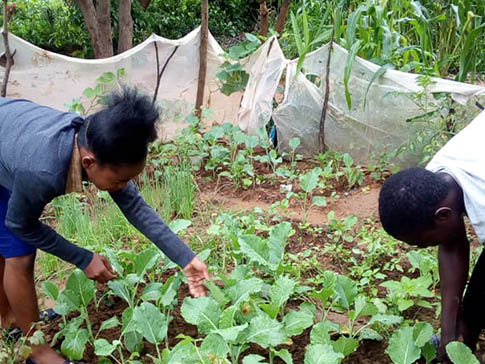CAMFED Association leader, Zambia

Winnie
Winnie comes from rural Zambia. She encountered grief early in her life, when her father passed away while she was still in high school. Winnie’s mother worked as a security guard, but with only one income the family struggled financially. Deeply affected by the loss of her father and fearing her family was locked in poverty, Winnie found it difficult to see how she could remain and thrive in school.
My dad used to encourage me to focus on school in order to have a bright life. I was in the best school in the district – I got through because of my performance. But after he died, I had a lot on my mind and it affected my studies.
“My dad used to encourage me to focus on school in order to have a bright life. I was in the best school in the district – I got through because of my performance. But after he died, I had a lot on my mind and it affected my studies.”
In Zambia — one of the poorest countries in the world — there is a wide gender disparity in starting education, let alone finishing it. Girls are far more likely than boys to have to drop out of school. In rural areas in particular, barriers including poverty, teenage pregnancy and early marriage are intrinsically linked, barring the path to success for many Zambian girls.
Seeing she was at risk, Winnie’s local Community Development Committee identified her to receive a CAMFED bursary. Her teachers had noticed a decline in her performance following her father’s death. As part of her support Winnie could talk to a trained Teacher Mentor about her challenges, and was provided with school essentials including a uniform, shoes, sanitary pads and stationery.
This package of support became even more vital to Winnie after the tragic death of her mother when she was in Grade 10. She remembers: “The bursary kept me and I knew that by finishing secondary school, I can bring change.”
Education taught me that what a man can do, a woman can do.
Winnie shares her remarkable resilience and optimism with other members of the CAMFED Association. After graduation, she joined this network of young women educated with CAMFED support, and committed with her peers to paying forward the benefits of education.
I always told my mother that since I had achieved the exam results I needed to go to the best secondary school in my district. I wanted to go to university, but I didn’t know how to. CAMFED’s Transition training changed my life. It opened my eyes to a lot of opportunities.
“I always told my mother that since I had achieved the exam results I needed to go to the best secondary school in my district. I wanted to go to university, but I didn’t know how to. CAMFED’s Transition training changed my life. It opened my eyes to a lot of opportunities.”
With this continuing support after school, Winnie fulfilled her dream of going to university. She chose to pursue a degree in Education, with certificates in project planning and management, and monitoring and evaluation at the University of Zambia. Having participated in life skills and entrepreneurship training through the CAMFED Association, as well as receiving a small grant, Winnie also founded a clothing business to help earn an income while she studied.
I knew how to manage tertiary education. I learned how to take care of myself and more importantly, I gained knowledge on how I can be beneficial to my community.
Using the profits from her business, Winnie has been able to build a house for her and her three brothers, whom she is now supporting through school and university. She has also continued volunteering with the CAMFED Association, supporting literacy projects, and advocating against child marriage and gender-based violence, and for climate-smart farming.
I am always thinking about how I can inspire change. I spoke to women in Chazanga and noticed that they want their children to access education. However, they lack the finance or training to farm successfully in a context of extreme climate effects, or make enough to send their children to school.
From a young age Winnie was aware of a link between extreme poverty, hunger, and gender-based violence. She launched a pilot project in August 2019 to empower women through agriculture by providing them with seeds and supporting them to establish climate-smart vegetable gardens to support their families and sell the surplus. Through the pilot, she hopes more women will feed their families, run successful climate-smart businesses and step-up as role models in society.
Winnie started a pilot project with one woman, growing Chinese cabbage, African eggplant, and rape, and she offers business mentoring and support to many others in her community. Now the Zambian Ministry of Gender is encouraging her goal to expand the project into a women’s cooperative and create a demonstration farm.

Winnie (left) checking on the garden plot that sustains a local family.
Through the pilot, I want to show people in my community what is possible.
Working together, the women harvest and sell their produce, saving 10% of the profits to help them scale the project. It is Winnie’s ambition to reach more mothers in the community as well as young women in the CAMFED Association. She says: “That will give me a strong sense of accomplishment.”
